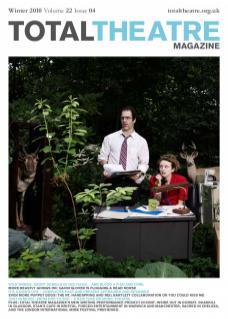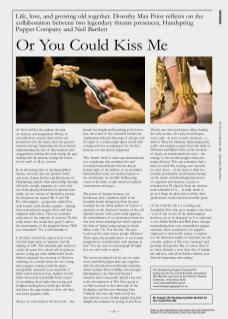Or You Could Kiss Me explores the play of memory and imagination: Where, in our reflections on past times and in our projections into the future, does the present moment belong? Separating fact from fiction, understanding the lure of false memory and exaggeration, seeking the truth, facing the past, dealing with the present, fearing the future – it’s the stuff of all of our lives.
In an interesting take on autobiographical theatre, two men who are partners in life and work (Adrian Kohler and Basil Jones of Handspring) explore their relationship through, obviously enough, puppetry, in a story that sees them playing themselves in present-time reality (or one version of themselves anyway: the characters are named ‘Mr A’ and ‘Mr B’), with puppets – gorgeously crafted five-sixth human sized wooden puppets – playing their remembered younger selves and their imagined older selves. There are constant references to the tripwires of memory (‘Is that really where they would have gone?’) and to the uncertainties of the imagined future (‘Will you remember?’ ‘Yes, I will remember.’)
It all circles around the urgent need to sort out their legal status as ‘partners’ and the making of wills. This mundane plot anchor is a kick-off point for a whole raft of glorious scenes: young gay male adulthood in South Africa is captured in a moment of first love centering on a seaside swim, the two ‘young men’ puppets soaring round the space, energetically animated by an ensemble of black-suited, barefoot men; bedtime for the elders forecasted in painfully funny scenes of grumbling about night-time peeing and hospital smoking bans, which give Kohler and Jones the opportunity to show off their renowned puppetry skills.
Always we come back to the key motif – the breath: the heightened breathing as the lovers kiss; the sound of the swimmer’s breath; the emphysema-induced wheezing of old age; and the sighs of a restless night spent in bed with a long-term lover, wondering if the last kiss between you has already happened.
This ‘breath’ motif is taken up enthusiastically in a soundscape that combines live and recorded/treated breath with the almost-human sighs of the bellows of an accordion. Disembodied voices are another feature of the soundscape: an invisible barking dog; voices in the dark; a radio tuned in; replayed answerphone messages…
The power of human memory, our ‘involuntary attic’, manifests itself in the beautiful details dredged up from the past: nostalgia for the yellow packets of Craven A cigarettes as the characters ‘partake of the old Spanish custom’ with a post-coital cigarette; the remembrance of a conversation about ties that now seems amusing, but which captures the fears of being young and gay in South Africa in the 70s: ‘Not the blue. We can’t both wear the same colour, people will know.’ There again, the powerlessness of our human imagination is manifested in such musings as this: ‘You can stare at a photograph all night but you can’t make it speak.’
The scenes are played out by our two main actors and their puppet alter-egos together with the aforementioned all-male ensemble, which includes Mervyn Millar, who brought Handspring to the National Theatre’s attention and consequently played a key role in the development of War Horse (good to see Mervyn back on the other side of the footlights); and the ever-charming Finn Caldwell, who not only barks nicely but also operates a very lovable puppet dog that delights the audience by peeing on the floor.
There’s one other performer, Adjoa Andoh, the only woman, who plays housekeeper, nurse, and – in more esoteric moments – a kind of Deus Ex Machina, declaiming poetic truths and reciting excerpts from the myth of Philomen and Baucis (who, at the moment of death, are transformed into trees – the analogy to the wooden puppet characters being obvious). This can sometimes feel a little too much like wearing one’s research on one’s sleeve – never more so than in a horribly postmodern ‘performative lecture’ on the nature and physiological processes of cognition and memory, a scene so irritating that I’d wiped it from my memory until reminded of it… It really needs to go as it drags the piece into a whole other performance mode that feels horribly passé.
Or You Could Kiss Me is a touching and thoughtful show that goes straight to the heart – even if one or two of the dramaturgical decisions are to be despaired at. It is a pleasure to see Adrian Kohler and Basil Jones onstage manipulating their own extraordinary puppet creations. How wonderful to see puppets employed to tell true life stories; to explore not the fantastical realms of fairytales, but the everyday realities of life, love, ‘marriage’ and growing old together. But of course there is no more fantastic a story than that of human life and love, with all its foibles, frailties, and fairytale beginnings and endings.
The Handspring Puppet Company/NT production Or You Could Kiss Me, directed by Neil Bartlett, was seen at the National Theatre, Cottesloe, 14 October 2010. www,nationaltheatre.org.uk www.handspringpuppet.co.za

